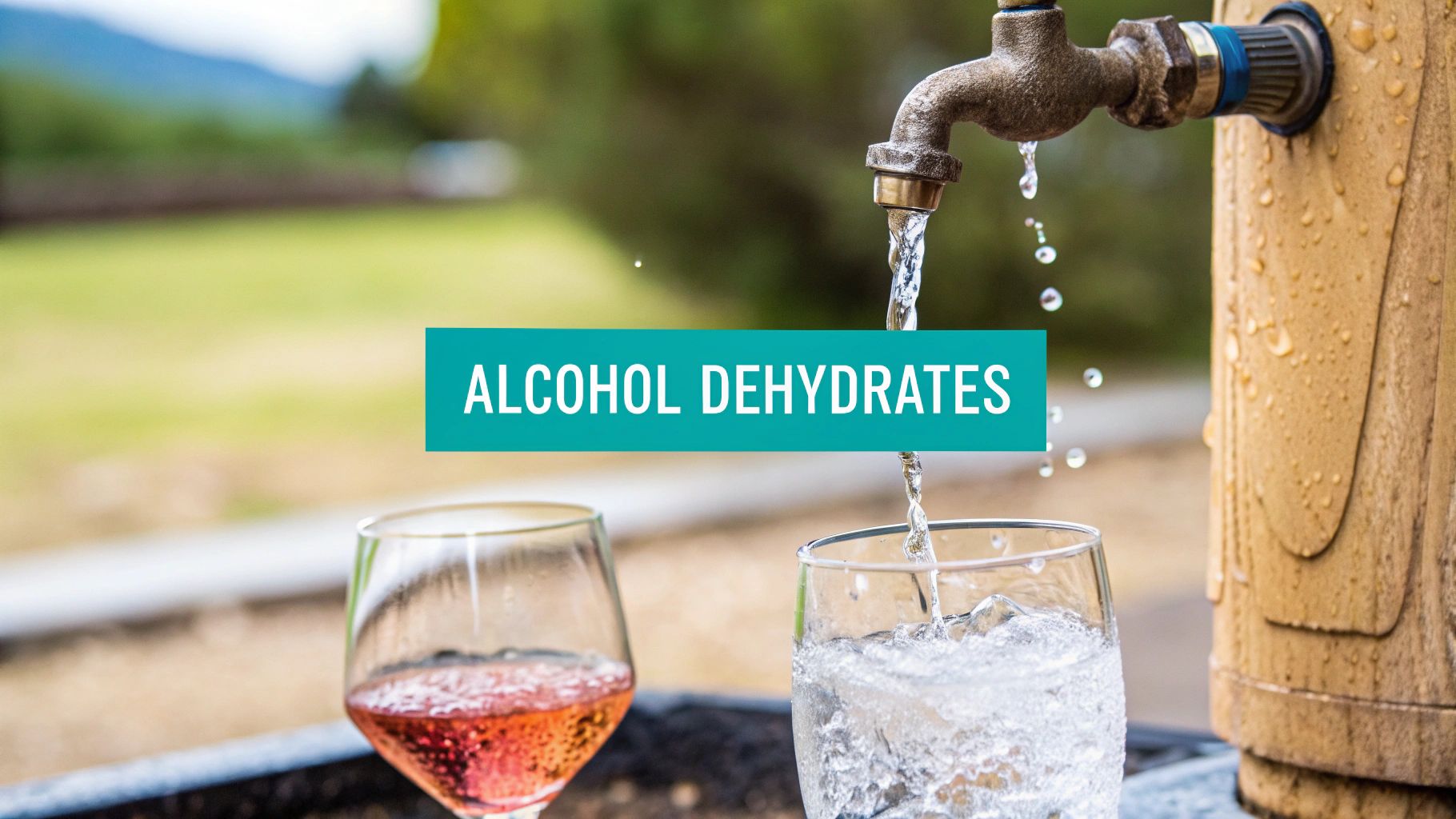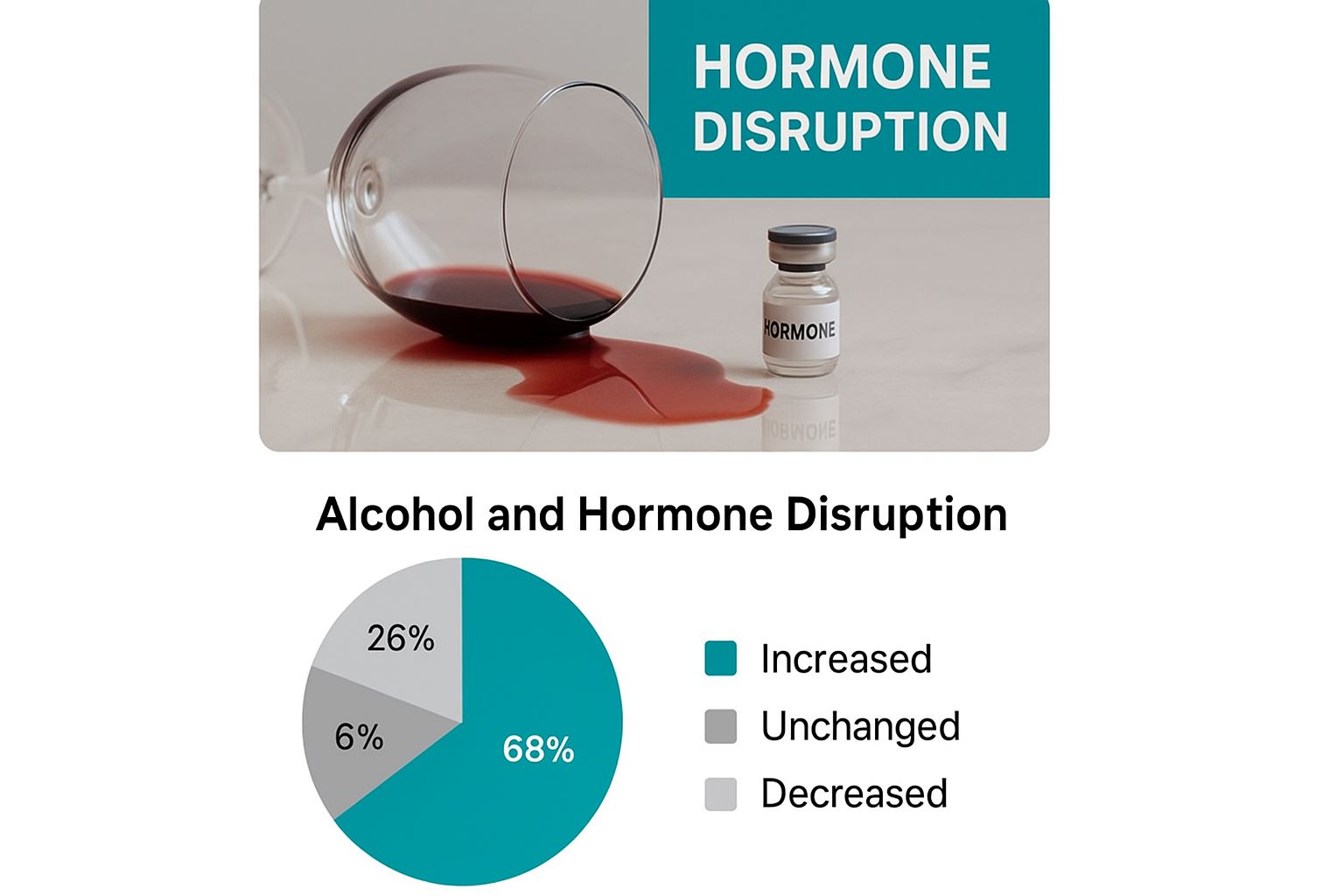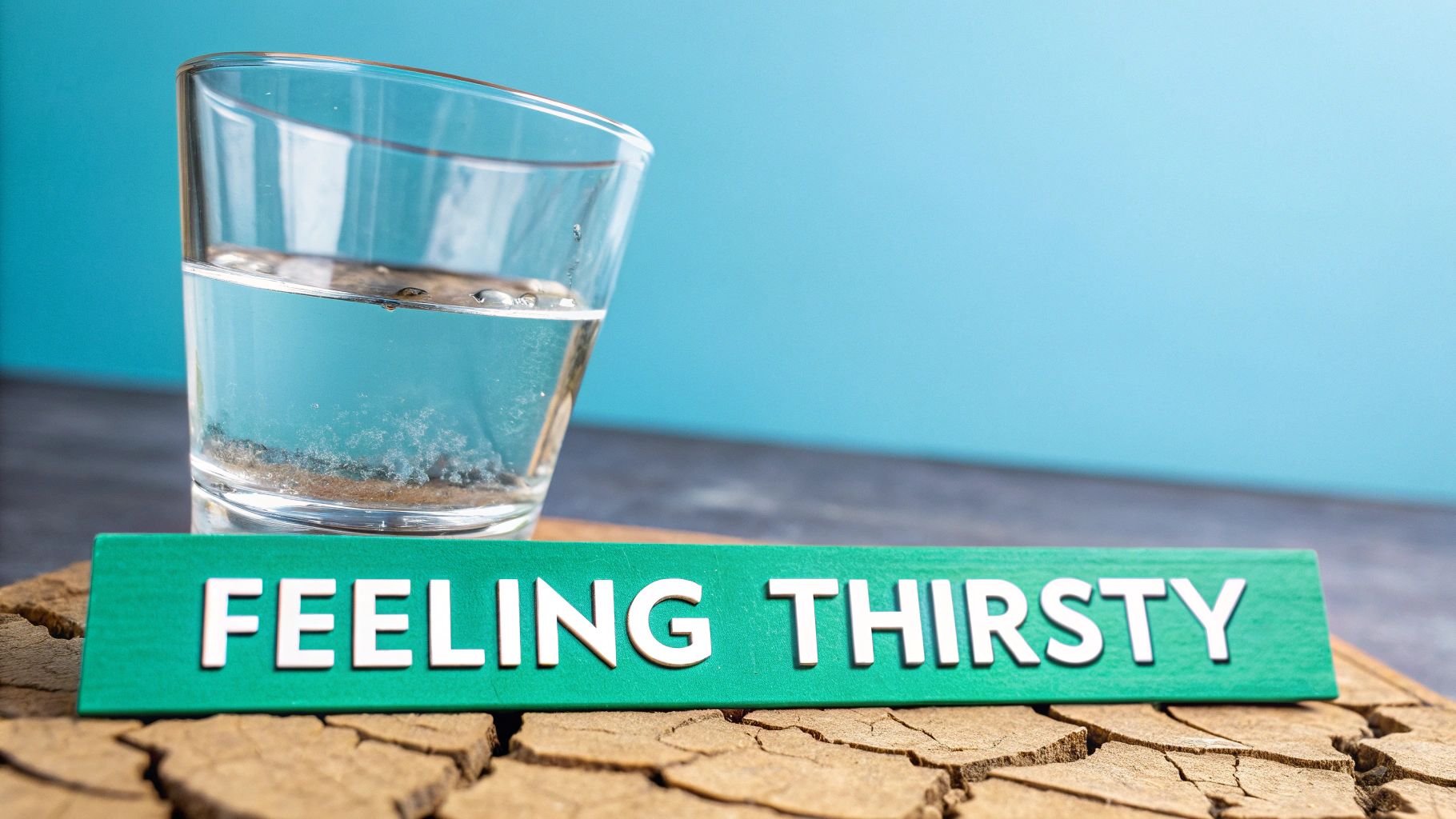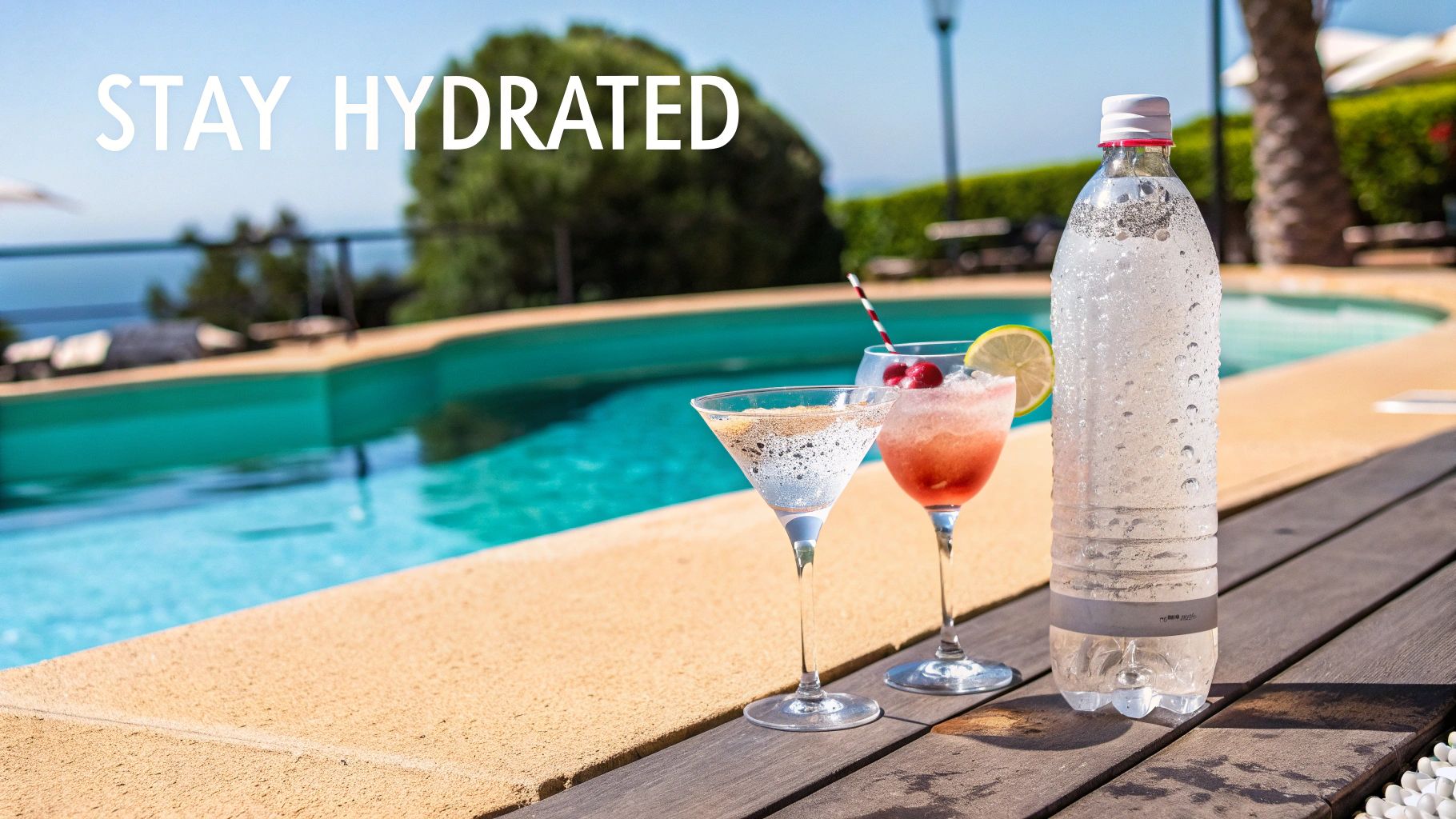

· By Annemarie
Why Does Alcohol Dehydrate You? Find Out the Surprising Reasons
The Hidden Story: How Your Body Becomes A Leaky Water System
Imagine your body as a meticulously designed water park, with slides, pools, and splash zones, each requiring a specific water level. This intricate system manages about 2.5 liters of water every single day, keeping everything running smoothly. But introduce alcohol into the mix, and suddenly, your well-maintained water park turns into a chaotic, leaky mess. Let's dive into why alcohol dehydrates you so effectively.
This image illustrates how water is distributed throughout the body:
As you can see, water plays a vital role in numerous bodily functions, highlighting the importance of staying properly hydrated. Alcohol, unfortunately, disrupts this delicate balance.
The Kidney's Role in Hydration
Think of your kidneys as the diligent lifeguards of your internal water park. They constantly filter your blood, carefully determining how much water to keep in circulation and how much to release as urine. This crucial process is primarily regulated by the antidiuretic hormone (ADH), also known as vasopressin. ADH ensures the water park maintains the perfect water level, keeping everything in harmony.
Alcohol's Disruptive Influence
Alcohol, however, interferes with ADH's ability to perform its job. It's like suddenly muting the lifeguard's whistle – the kidneys lose their clear instructions and start releasing more water than necessary. This increased urine production leads to dehydration and explains those more frequent bathroom trips after a few drinks. For a deeper dive into how your body processes alcohol, check out this helpful resource: Learn more about how alcohol is metabolized.
Individual Variations in Response
Just like different water parks have unique plumbing systems, the extent to which alcohol disrupts your hydration varies from person to person. Factors like how much and how frequently you drink, the type of alcohol consumed, and your initial hydration level all play a role. Some people’s “plumbing” might be more resilient to alcohol's disruptive effects than others.
This complex interplay highlights why some individuals seem to handle alcohol better than others. Understanding these foundational principles sets the stage for exploring the specific mechanisms behind how alcohol impacts ADH and your kidneys.
The Hormone Hijack: When Alcohol Crashes Your Kidney's Party
Think of your brain and kidneys like two constantly communicating gardeners, meticulously watering their prize-winning petunias. Your brain, the head gardener, checks the soil's moisture and tells the kidneys, the diligent assistant, how much water to give the plants. This “water conservation hotline” is managed by a hormone called vasopressin.
This system is incredibly responsive, adjusting hydration minute by minute. But what happens when a mischievous party guest, alcohol, stumbles onto the scene?

This infographic perfectly illustrates the disruption. Imagine alcohol as that spilled wine, knocking over the vial of vasopressin and disrupting the delicate hormonal balance. Alcohol doesn't just make you thirsty; it actively interferes with your body's ability to regulate its own hydration.
The Vasopressin Blackout
This hormonal interference starts soon after your first sip. Alcohol inhibits the release of vasopressin, essentially telling your kidneys to overwater the petunias, flushing precious water out of the system. This explains those frequent trips to the bathroom.
This is why alcohol-induced dehydration feels different from the thirst you feel after a workout. Exercise-induced thirst is a simple request for more water. Alcohol-induced dehydration, on the other hand, is a hormonal hijacking, a disruption from within.
Alcohol's Dehydrating Math
For every 10g of alcohol you consume (roughly one standard drink), your urine output increases by about 100 mL above normal. Let’s say you’ve had four beers. Each beer contains roughly 14g of alcohol per 350mL serving, totaling over 2.3 standard drinks. This means you could be losing over 400 mL of extra fluid! Considering 30-40% of adults in the UK and US report binge drinking monthly, it's no wonder alcohol-induced dehydration is such a common issue. Want to dive deeper? Discover more insights.
The duration of this “vasopressin blackout” depends on how much alcohol is consumed and how quickly your body processes it. The longer the disruption, the more dehydrated you become, paving the way for those dreaded hangover symptoms.
To further understand the link between your drink of choice and dehydration, let's look at a practical comparison:
Alcohol Content vs. Fluid Loss Comparison Shows the relationship between different alcoholic beverages and their dehydrating effects based on alcohol percentage and typical serving sizes.
| Beverage Type | Alcohol % | Standard Serving | Expected Extra Urine Output | Dehydration Risk Level |
|---|---|---|---|---|
| Beer (Light) | 4% | 12 oz (355 mL) | ~100 mL | Low |
| Beer (Regular) | 5% | 12 oz (355 mL) | ~140 mL | Low-Moderate |
| Wine (White/Red) | 12% | 5 oz (148 mL) | ~180 mL | Moderate |
| Spirits (Vodka/Whiskey/Gin) | 40% | 1.5 oz (44 mL) | ~160 mL | Moderate-High |
| Cocktail (Margarita/Mojito) | Varies (often >15%) | Varies (often >6 oz) | Varies (often > 200 mL) | Moderate-High |
This table highlights how different drinks contribute to fluid loss. Notice how higher alcohol percentages and larger serving sizes lead to greater urine output and, consequently, a higher risk of dehydration. Factors like individual metabolism and hydration levels before drinking also play a significant role. So, while this table offers a general guide, it's crucial to listen to your body and stay hydrated.
The Surprising Truth: Why Your Drink Choice Actually Matters
Imagine planning a road trip. A small car might be fine for a quick errand, but you’d definitely want something bigger for a cross-country adventure. Choosing a drink is similar. A light beer might not dehydrate you as much as a potent cocktail. But it goes beyond the obvious beer-versus-vodka comparison; even drinks that seem similar can affect your hydration differently.
So, why does alcohol dehydrate you in the first place? Essentially, it throws a wrench in your body’s natural water regulation system. It’s more than just the diuretic effect that makes you visit the bathroom more frequently. Alcohol disrupts the careful balance of hormones and kidney function, resulting in a greater fluid loss than you'd anticipate.
This image showcases the wide spectrum of alcoholic beverages, from light beers to strong liquors. This variety highlights a key point: not all drinks dehydrate you equally. The alcohol content and how much you drink play significant roles in how your body manages fluids.
Alcohol's Dehydrating Effect: A Closer Look
Alcohol-induced diuresis is a well-known effect, but the level of dehydration varies. Studies show that drinks with up to 2% alcohol don’t significantly dehydrate you after exercise, unlike stronger options. For example, research indicates that a 4% alcohol beverage (like most beers) can lead to an 18% reduction in fluid retention compared to non-alcoholic beverages. Discover more insights.
This difference means some drinks might only slightly nudge your body towards dehydration, while others practically shove it down that path. Understanding these nuances helps you make informed choices, whether you’re out for a casual drink or celebrating a special event.
Reading Your Body's SOS Signals: Beyond The Obvious Thirst
Your body is constantly talking to you about its hydration levels, but alcohol dehydration throws a curveball into the mix. These signals are like an early warning system, trying to get your attention before things get really out of hand. Unlike the straightforward thirst you feel after a workout, alcohol dehydration can show up in unexpected ways, like brain fog, mood swings, or just feeling unusually wiped out. Some signs appear pretty quickly after drinking, while others might not surface until the next day, creating a delayed reaction.

This screenshot from Wikipedia illustrates the range of dehydration symptoms, from minor discomfort to serious medical emergencies. This spectrum highlights just how important it is to catch and address dehydration early on.
Dehydration's Timeline and Telltale Signs
Knowing the typical timeline of dehydration symptoms can help you separate normal post-drinking tiredness from actual dehydration. Many people chalk up fatigue solely to the alcohol itself, but lingering symptoms might be pointing to a deeper fluid imbalance. So why does alcohol dehydrate you so effectively? It messes with a key hormone called vasopressin. This hormone is responsible for regulating your body's water balance, and alcohol essentially tells your kidneys to flush out more water than they should. This disruption, combined with alcohol’s natural diuretic effect, leads to significant fluid loss. This also explains why, even after rehydrating, some symptoms might stick around. Alcohol dehydration is different from dehydration caused by heat, exercise, or illness because it targets your body’s internal water management system.
Let's break down the timeline of symptoms to give you a clearer picture. The following table shows how dehydration can progress and what actions you should take at each stage.
| Time After Drinking | Mild Symptoms | Moderate Symptoms | Severe Symptoms | Action Required |
|---|---|---|---|---|
| A few hours | Slight headache, mild thirst, dry mouth | Increased thirst, dizziness upon standing, fatigue | Severe headache, muscle cramps, rapid heartbeat, vomiting | Drink water, consider an electrolyte beverage. |
| The next morning | Fatigue, headache, dry mouth, difficulty concentrating | Dizziness, lightheadedness, muscle weakness, increased heart rate | Confusion, disorientation, inability to keep down fluids, fainting | Seek medical attention immediately if severe symptoms are present. Otherwise, continue rehydrating with water and electrolyte drinks. Consider using Upside Hangover Sticks. |
| Beyond 24 hours | Lingering fatigue, difficulty concentrating | Continued weakness, persistent dizziness | Symptoms haven't improved or have worsened | Consult a doctor if symptoms haven't subsided significantly after 24 hours. |
This table provides a general guideline. Individual experiences can vary, so listen to your body and address any signs of dehydration promptly.
Recognizing the Difference: Alcohol Dehydration vs. Other Types
While thirst is a common sign, alcohol dehydration can sneak up on you with symptoms that don’t seem related to fluid loss at all. For example, have you ever struggled to focus or experienced unexpected mood swings after drinking? These can be subtle clues that you're dehydrated. Plus, alcohol dehydration often comes with a delayed reaction, making it harder to connect the cause and effect. Recognizing these distinct signs empowers you to take action before dehydration significantly impacts your health, work, or overall well-being.
Prevention Strategies That Work In Real Social Situations
Let's be real, most hydration advice goes out the window the moment you step into a social setting. Telling someone to "drink a glass of water between each alcoholic beverage" sounds great on paper, but it’s rarely practical. Effective prevention is about having strategies that actually work in the real world. Think of it like building a protective barrier, giving your body the resources it needs to handle alcohol's dehydrating effects without putting a damper on your fun.
Pre-Hydration: Your Body's First Line of Defense
One of the smartest moves you can make is pre-hydrating. Starting your evening well-hydrated gives your body a major advantage. Imagine filling a reservoir before opening the dam; the more water already stored, the less impact the outflow will have. This isn't about chugging water right before you head out; it's about consistent hydration throughout the day leading up to the event.
The Electrolyte Advantage: Why Water Isn't Enough
Why does alcohol dehydrate you so effectively? It messes with your electrolyte balance. Alcohol increases urine production, flushing out not just water but essential electrolytes like sodium and potassium. These electrolytes are crucial for a range of bodily functions.
This image shows the chemical structures of some key electrolytes, illustrating their complexity and highlighting why replenishing them is so vital for proper hydration. This is why plain water isn't always enough. Consider electrolyte-rich drinks or even specialized hydration products, like Upside Hangover Sticks, designed to support your body during and after social drinking.
Pacing and Meal Timing: A Strategic Approach to Drinking
How you pace your drinks and when you eat also makes a big difference. Eating a meal before or during drinking can help slow alcohol absorption and create a buffer against dehydration. Similarly, spacing out your drinks gives your body more time to process the alcohol and maintain fluid balance. This isn't about drinking less; it’s about drinking smarter.
Specialized Hydration Solutions: Exploring Your Options
Innovative products like Upside Hangover Sticks provide a convenient way to address dehydration. They’re designed specifically for social drinking, offering a targeted blend of electrolytes and other helpful ingredients. While these products can be beneficial, they aren’t a magic fix. They work best as part of a comprehensive hydration strategy. For more rehydration strategies, you might find our guide on rehydration after drinking helpful. By combining these practical tips, you can enjoy social events without the worry of alcohol's dehydrating effects.
Recovery Game Plan: When Prevention Wasn't Enough
Sometimes, even with the best intentions, we wake up feeling less than stellar after a night out. While preventing a hangover is ideal, knowing how to bounce back is essential. Recovering from alcohol-induced dehydration isn't about guzzling liters of water; it's about understanding what your body truly needs to regain its equilibrium.
Why does alcohol dehydrate you so effectively? Think of it as a sneaky saboteur disrupting your body's finely tuned fluid balance, leading to excessive fluid loss. This disruption calls for a strategic rehydration approach, not just a quick fix.
This image illustrates a helpful approach to rehydration therapy after dehydration from various causes:

The screenshot highlights the importance of replacing not only fluids but also vital electrolytes lost during dehydration – a key element in bouncing back from alcohol's dehydrating effects. Strategic rehydration focuses on restoring this delicate balance.
Assessing Your Hydration Status
The first step is understanding the extent of your dehydration. Check for common symptoms like dry mouth, headache, and fatigue. These can indicate the severity and guide your recovery plan. Remember, these symptoms can be delayed, so don’t assume you’re in the clear just because you don't feel thirsty right away.
Strategic Rehydration: Beyond Just Water
Effective rehydration goes beyond plain water. It's vital to replenish electrolytes lost due to alcohol’s diuretic effect. Consider electrolyte drinks or specialized solutions like Upside Hangover Sticks, formulated to address these specific needs.
Timing Your Fluids: A Gradual Approach
Avoid overwhelming your system by chugging water. A gradual approach is gentler on your stomach and more effective for rehydration. Sip fluids consistently throughout the day rather than trying to play catch-up all at once. For more insights into the science of hangovers, check out this helpful article: Learn more in our article about what causes hangovers.
When to Seek Professional Help
While most alcohol dehydration can be managed at home, recognizing when to seek medical attention is important. Severe symptoms like confusion, vomiting, or an inability to keep down fluids warrant immediate medical intervention. Knowing the difference between a normal recovery and a serious situation is crucial for your well-being.
Your Personal Action Plan: Drinking Smarter, Not Less
Now you understand the science behind why alcohol dehydrates you, let's talk strategy. This isn't about giving up the good times, it's about enjoying them responsibly and waking up feeling like a human.
Building Your Hydration Toolkit
Think of hydration like prepping for a marathon. You wouldn't show up without the right gear, would you? Your hydration toolkit should have a few key items:
- Pre-hydration: Imagine watering a plant before leaving for vacation. Giving your body a good dose of water before you start drinking sets you up for success.
- Alternating Beverages: Think of it as a dance between water and your chosen drink. For every alcoholic beverage, follow it up with a glass of water. This simple rhythm helps maintain your body's fluid balance.
- Electrolyte Boost: Alcohol flushes out essential electrolytes. Replenishing them with electrolyte-rich drinks, or even something like Upside Hangover Sticks, can help bring things back into balance.
- Mindful Choices: Consider what you're drinking. Lower-alcohol options and smaller servings can make a surprising difference in how dehydrated you get.
Tailoring Your Strategy to the Situation
Just like choosing the right outfit, your hydration strategy should fit the occasion.
- Casual Get-Togethers: For a relaxed evening with friends, alternating drinks and pacing yourself might be all you need.
- Celebrations: Bigger events often lead to more drinks. Ramp up the pre-hydration and consider adding electrolyte supplements to your routine.
- Travel: Traveling itself can be dehydrating. Factor in alcohol, especially on flights, and you're in a double-whammy situation. Be extra diligent about your water intake.
The Power of Recovery: Bouncing Back Strong
Even the best-laid plans can go awry. If you wake up feeling dehydrated, focus on rehydrating slowly and steadily. Sipping water consistently throughout the day is key. Electrolyte drinks or hydration products can help you bounce back faster.
Understanding the science behind alcohol-induced dehydration gives you the power to take control. By incorporating these strategies, you can enjoy social occasions without sacrificing your well-being. Ready to upgrade your hydration game? Upside Hangover Sticks can be a valuable addition to your toolkit, offering convenient and effective support. Check them out here!
